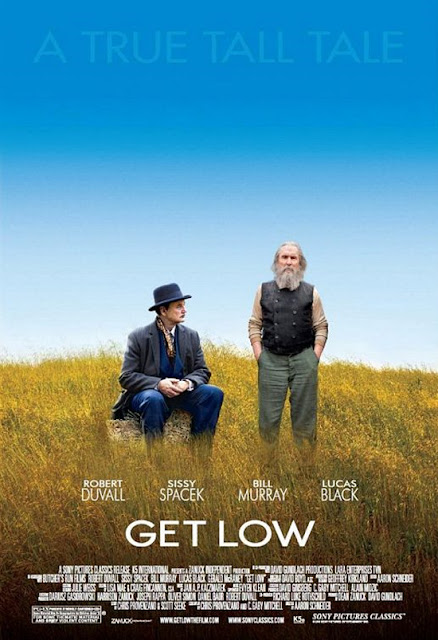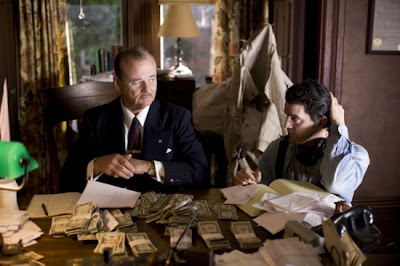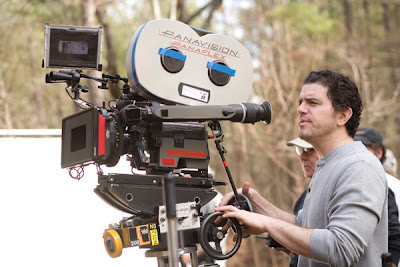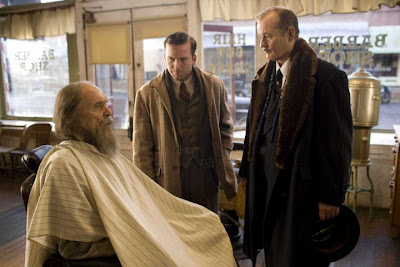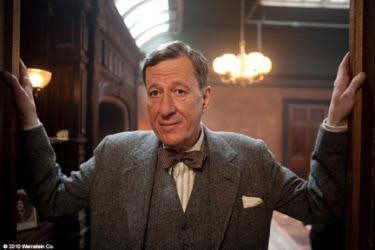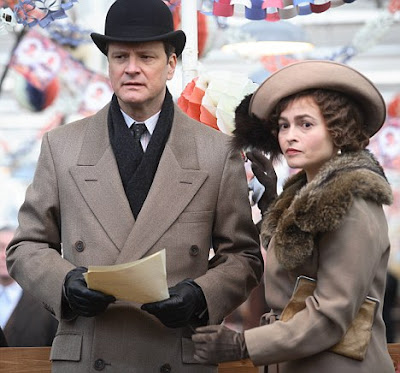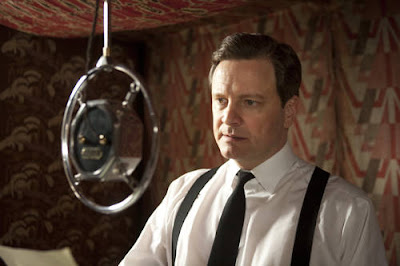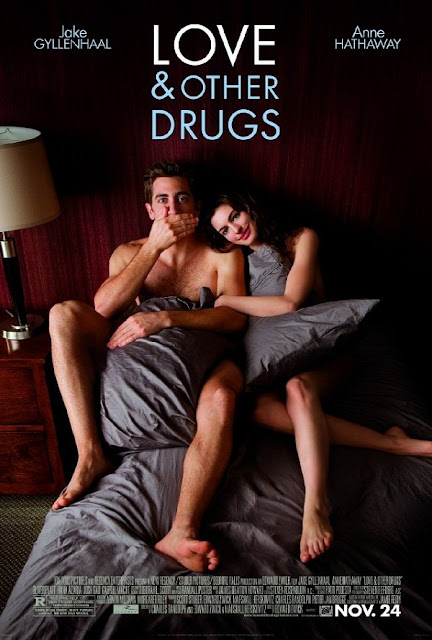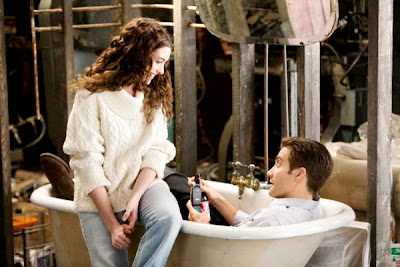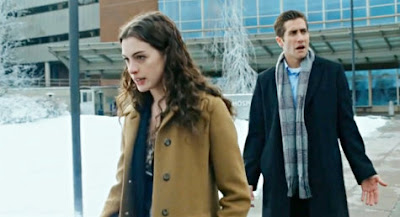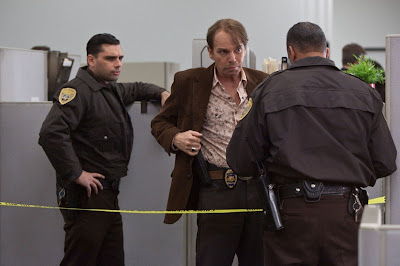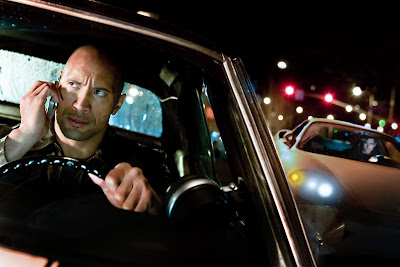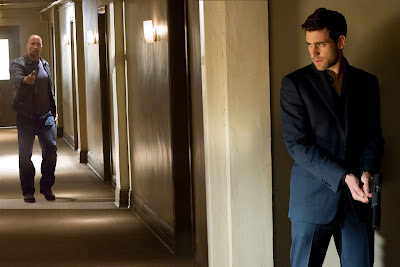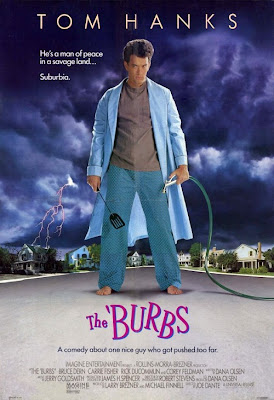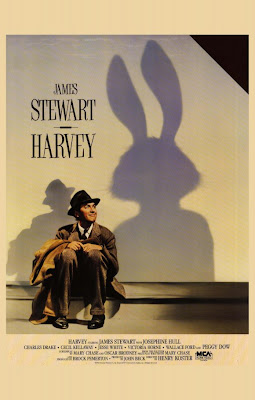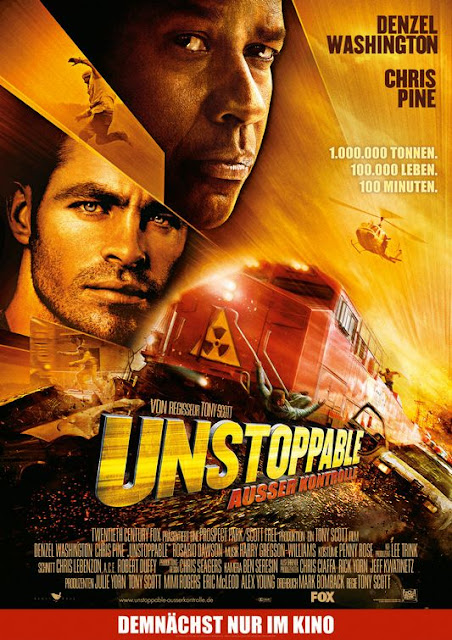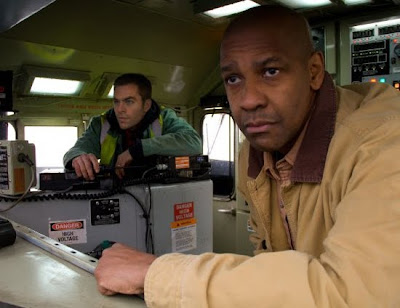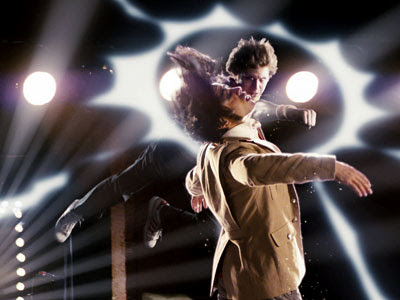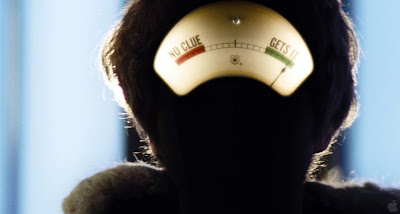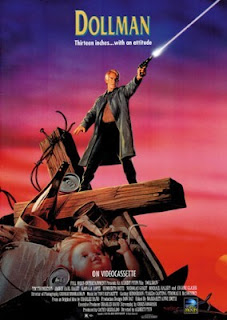A slow-paced examination of a man coping with self-imposed exile, Get Low is a subdued movie that provides a showcase for yet another fantastic performance from the legendary Robert Duvall. Director Aaron Schneider shows promise here in his debut feature, and proves (if nothing else) he has an excellent grasp on creating atmosphere.
Get Low
Director: Aaron Schneider
Starring: Robert Duvall, Sissy Spacek, Bill Murray, Lucas Black
This is the type of movie the Academy loves: a small independent film featuring powerful acting and establishing a great sense of place. Loosely based on true events, the story follows Felix Bush, a Southern hermit who hires a couple of funeral home workers (Bill Murray and Lucas Black) to throw him a "funeral party" he wants to attend before he dies. The film also charts his relationship with Maddie (the charming Sissy Spacek), whose family indirectly caused his hermitage.
Avoiding comparisons to Tom Sawyer will be difficult for this film, but the main story difference between the haggard Bush and the spry Sawyer is that Bush isn't hiding at his own funeral. He invites the entire town to come out - in fact, he wants anyone who has a story to share about him (there are many since, after all, he's a hermit) to come out and tell it. Through his time spent reunited with Maddie and old pastor friend Charlie (played by "you'd know him if you saw him" Bill Cobbs), Felix discovers he doesn't want to hear stories about himself; instead, he wants to tell his own story to everyone to set the record straight and ease his conscience.
Any time a new Bill Murray movie comes out, a certain segment of the population rejoices. I am a member of that segment. Murray is great here as the quasi-sleazy funeral home owner desperate for money. Constantly sneaking drinks from a flask, Murray's trademark deadpan humor fits this character better than most considering the black humor that must be employed when dealing with dead bodies all day. Lucas Black, who many might recognize from The Fast and The Furious: Tokyo Drift, was actually tolerable as Murray's sidekick and followed Duvall around for most of the movie dealing with his eccentricities. The movie also featured a small acting appearance by Crazy Heart director Scott Cooper, marking another collaboration with Duvall (who co-starred in and produced Cooper's movie). The dialogue between these two is solid as well, with the mentor Murray dropping bits of wisdom like, "If you don't do this yourself, you'll never know if you're any good. And you'll never be good if you don't know that you are."
Technically speaking, the movie was very well made - especially for a debut film. The opening shot - a striking static shot of a building burning in the dark - was haunting and sticks in your mind for the rest of the movie. The production design is exceptional, utilizing a woodsy color palette perfect for the setting and tone of the film. The music also stood out in an effective way, featuring a nice mix of slide guitar, banjo, and bluegrass instrumental bits with more famous songs like "" by the Ink Spots (famously used in The Shawshank Redemption).
All that said, there's something about Get Low that didn't quite connect with me the way the filmmakers were presumably hoping. I'm not entirely sure what it was - perhaps the story was a bit too familiar, perhaps the slow pace threw me off, or the fact that it was funny, but not overly so - but I wasn't as hooked or moved as the story seemed to desire. I'm not implying this is a bad film - so much worse has come to theaters this year - but if you're not a huge Duvall or Murray fan, I'd say wait for a rental. Until next time...
Tuesday, November 30, 2010
Monday, November 29, 2010
The King's Speech
I like to consider myself a fan of most movie genres, but I'd be hard-pressed to find a "historical biopic" that I'd count among my favorite films. While The King's Speech does nothing to change that particular claim, it is a fairly enjoyable movie that tackles some serious subject matter with a bit of humor and charm mostly lost in a genre that seems to pride itself on pomp and stuffiness.
It's easy to see why Colin Firth is getting Oscar buzz for his work as the eventual King George VI of England in this movie: it's a powerful performance, at various times full of self-loathing, uncertainty, stubbornness, and redemption. The King's Speech is a feel-good movie, but one that doesn't overtly manipulate the audience while providing some interesting commentary on the power of communication in the digital age. Based on true events, the film chronicles the rise of the Duke of York (Firth), plagued with a stammer, to the position of King and his relationship with a common speech therapist enlisted to help him, Lionel Logue (Rush).
The King's Speech
Director: Tom Hooper
Starring: Colin Firth, Geoffrey Rush, Helena Bonham Carter
It's easy to see why Colin Firth is getting Oscar buzz for his work as the eventual King George VI of England in this movie: it's a powerful performance, at various times full of self-loathing, uncertainty, stubbornness, and redemption. The King's Speech is a feel-good movie, but one that doesn't overtly manipulate the audience while providing some interesting commentary on the power of communication in the digital age. Based on true events, the film chronicles the rise of the Duke of York (Firth), plagued with a stammer, to the position of King and his relationship with a common speech therapist enlisted to help him, Lionel Logue (Rush).
Director Tom Hooper has been earning critical praise for his work for many years now, most recently with the well-reviewed John Adams miniseries on HBO. His confidence behind the camera shows here in a testament to subtlety; one can easily imagine a melodramatic version of these events, and I much preferred Hooper's subdued take on the material. Aside from easing solid performances out of his actors, Hooper isn't afraid to add a bit of flair to the proceedings; in one "training" scene, the camera rolls forward and backward over the same piece of living room floor, but each time it rolls back, it reveals the characters in another state of training. The movie cashes in on one of humanity's biggest fears - public speaking - and doesn't shy away from uncomfortable situations to really drive home how important this aspect of royalty truly is. At times, the film is agonizing to watch; we feel so bad for our hero that we desperately want him to succeed, and Hooper is able to skillfully strike that balance.
But as much as this is Colin Firth's movie, it also belongs to Geoffrey Rush. The two are downright jovial together on screen, and their budding friendship is almost impossible not to like. Rush brings aforementioned humor and charm in spades, dropping the King down a few pegs during their sessions by demanding equality and referring to him not as "Your Majesty," but as "Bertie." (Before he adopts the "King George VI" moniker, he's known as Prince Albert. Hence, "Bertie.") Helena Bonham Carter plays one of the most normal characters she's played in years here as Queen Elizabeth, forever supportive of her husband as he yearns to be rid of his crippling stammer.
As if the stammer weren't enough, "Bertie" is humanized even more by the scenario in which he finds himself: his older brother David (nicely played by underrated actor Guy Pearce) leaves the throne to marry a divorced woman, leaving the younger brother to fill in during the beginning of WWII. The title The King's Speech refers not only to the unfortunate speaking patterns of Colin Firth's character, but also a singular speech that occurs during the climax of the film. (It's also a play on the phrase "the King's English," but that's not as obvious.) The movie is paced a bit slow for my tastes, but remains enjoyable to watch - any scene which features Rush and Firth is a treat. But the ones that don't cause the movie to drag on a bit, and hope for another interaction between these fledgling friends.
It's tough to make a movie about public speaking seem interesting, but Hooper takes on the challenge and relies on his excellent cast to do most of the work for him. Since they're all capable actors, they easily accomplish this goal, and leave Hooper the work of making the speech scenes suspenseful because we never quite know how well Logue's unconventional approach to therapy will work. Recommended for those wanting to stay "in the know" this Oscar season, and for those who like well-acted feel-good dramas. Until next time...
Sunday, November 28, 2010
The NJNM Podcast: Ep. 19 - Good Will Hunting (Guest: Vince Mancini from FilmDrunk.com)
In Pat's absence, Ben and Tyler speak with Vince Mancini from FilmDrunk.com about Gus Van Sant's 1997 film, Good Will Hunting. A tangent regarding Arnold Schwarzenegger's holiday classic Jingle All The Way is a highlight.
Don't forget to call and leave us a voicemail at or e-mail us your thoughts at .
Saturday, November 27, 2010
Love and Other Drugs
Best known for films like Glory, The Last Samurai, and Blood Diamond, director Edward Zwick tackles somewhat lighter subject matter in Love and Other Drugs. Ostensibly a romantic comedy (and it does have many of those elements), the film manages to eschew the stale atmosphere of the genre and instead becomes a highly watchable tale of a relationship between a high-end pharmaceutical rep and a woman with a case of early-onset Parkinson's disease.
Love and Other Drugs
Writer/Director: Edward Zwick
Starring: Jake Gyllenhaal, Anne Hathaway, Oliver Platt
Set in the medicinal boom of the mid-to-late nineties, the movie keeps with music from that period and opens with "" by The Spin Doctors - a song (and band) of which I'm an unabashed fan to this day - so for me, this was the best opening to a movie since Yes Man, which opened with Journey's "." But back to the movie...
Jake Gyllenhaal plays Jamie Randall, a fast-talking stud who could sell ice to an Eskimo (is that politically incorrect?) and is just as efficient as a womanizer as he is as a salesman. He has smarmy confidence down to a science here - he channels Tom Cruise's '80s persona and convincingly pulls it off. Jamie has his career on the brain, moving his way from an electronics salesman to the upper echelon of Pfizer reps as Viagra hits the mainstream market.
While trying to convince a doctor (played by Hank Azaria) to prescribe his company's drugs, Jamie meets the bold and beautiful Maggie Murdock, a character who provides a wonderful change of pace for the talented and underrated Anne Hathaway. Sure, Maggie is sick - but that doesn't mean she's feeble. In fact, she's more brazen than the sex-crazed Jamie; she sees through his tactics and is totally up front with him about her intentions, avoiding the typical tropes of playing hard to get. Later, she is the one who resists a meaningful relationship. Maggie's illness pops up occasionally in the movie, but it doesn't define her character and Hathaway handles that aspect of her performance with tact and grace.
The thing that struck me most about this movie? Love and Other Drugs (like this year's Going the Distance) seemed to depict a more natural relationship than what we're used to seeing on screen. Part of this is surely due to the nudity fearlessly displayed by both leads, a rarity in a studio film thanks to the inexplicable ratings methods of the MPAA, whose members consider nudity more harmful than violence these days. Aside from that, the film captures the little moments really well; in a musical montage, a scene with Maggie and Jamie in a library plays out wordlessly but comes off as totally believable. Hathaway has some highly emotional moments in the script and commits to the role so well that we feel her pain. Late in the film, Jamie is involved in a tryst with other women where, in a lesser movie, Maggie would walk in and discover him. In this film, though, the consequences of that action are left only to Jamie's conscience and are never mentioned again.
Don't get me wrong: there are many, many elements of the romantic comedy featured here. Nearly every member of the supporting cast - Josh Gad as Jamie's overweight and sex-obsessed brother, Oliver Platt's mentor figure, Judy Greer's receptionist - is a rom-com standard, but their presence is thankfully overshadowed by the chemistry between the impossibly good-looking couple of Gyllenhaal and Hathaway. As the film progresses, it becomes clear what type of movie this is going to be and the elements start falling into place: The Separation, The Desperate Act To Win Her Back, The Final Impassioned Speech. But even with those check-the-box components, Love and Other Drugs somehow sneaks just above the eye-rolling quality of most of the movies in this genre.
If you haven't deduced this by now, this movie is definitely not one to watch with the family. Awkward situations of all kinds abound - mostly in scenes with Jamie's brother - but for those searching for a romance with more drama than outright comedy, this might be in your wheelhouse. As I said before, the movie is highly watchable; I'd take Love and Other Drugs over The Proposal any day. Until next time...
Love and Other Drugs
Writer/Director: Edward Zwick
Starring: Jake Gyllenhaal, Anne Hathaway, Oliver Platt
Set in the medicinal boom of the mid-to-late nineties, the movie keeps with music from that period and opens with "" by The Spin Doctors - a song (and band) of which I'm an unabashed fan to this day - so for me, this was the best opening to a movie since Yes Man, which opened with Journey's "." But back to the movie...
Jake Gyllenhaal plays Jamie Randall, a fast-talking stud who could sell ice to an Eskimo (is that politically incorrect?) and is just as efficient as a womanizer as he is as a salesman. He has smarmy confidence down to a science here - he channels Tom Cruise's '80s persona and convincingly pulls it off. Jamie has his career on the brain, moving his way from an electronics salesman to the upper echelon of Pfizer reps as Viagra hits the mainstream market.
While trying to convince a doctor (played by Hank Azaria) to prescribe his company's drugs, Jamie meets the bold and beautiful Maggie Murdock, a character who provides a wonderful change of pace for the talented and underrated Anne Hathaway. Sure, Maggie is sick - but that doesn't mean she's feeble. In fact, she's more brazen than the sex-crazed Jamie; she sees through his tactics and is totally up front with him about her intentions, avoiding the typical tropes of playing hard to get. Later, she is the one who resists a meaningful relationship. Maggie's illness pops up occasionally in the movie, but it doesn't define her character and Hathaway handles that aspect of her performance with tact and grace.
The thing that struck me most about this movie? Love and Other Drugs (like this year's Going the Distance) seemed to depict a more natural relationship than what we're used to seeing on screen. Part of this is surely due to the nudity fearlessly displayed by both leads, a rarity in a studio film thanks to the inexplicable ratings methods of the MPAA, whose members consider nudity more harmful than violence these days. Aside from that, the film captures the little moments really well; in a musical montage, a scene with Maggie and Jamie in a library plays out wordlessly but comes off as totally believable. Hathaway has some highly emotional moments in the script and commits to the role so well that we feel her pain. Late in the film, Jamie is involved in a tryst with other women where, in a lesser movie, Maggie would walk in and discover him. In this film, though, the consequences of that action are left only to Jamie's conscience and are never mentioned again.
Don't get me wrong: there are many, many elements of the romantic comedy featured here. Nearly every member of the supporting cast - Josh Gad as Jamie's overweight and sex-obsessed brother, Oliver Platt's mentor figure, Judy Greer's receptionist - is a rom-com standard, but their presence is thankfully overshadowed by the chemistry between the impossibly good-looking couple of Gyllenhaal and Hathaway. As the film progresses, it becomes clear what type of movie this is going to be and the elements start falling into place: The Separation, The Desperate Act To Win Her Back, The Final Impassioned Speech. But even with those check-the-box components, Love and Other Drugs somehow sneaks just above the eye-rolling quality of most of the movies in this genre.
If you haven't deduced this by now, this movie is definitely not one to watch with the family. Awkward situations of all kinds abound - mostly in scenes with Jamie's brother - but for those searching for a romance with more drama than outright comedy, this might be in your wheelhouse. As I said before, the movie is highly watchable; I'd take Love and Other Drugs over The Proposal any day. Until next time...
Wednesday, November 24, 2010
Faster
Recently, I noted that Tony Scott's Unstoppable "[took] absolutely no risks in telling the story." I found it to be fairly boring and a pretty terrible action movie. (Want to know why? Read the full review.) Bad news for Dwayne Johnson fans: Faster is so bad that it makes Unstoppable look like a masterclass in the action genre.
Faster
Director: George Tillman, Jr.
Starring: Dwayne Johnson, Billy Bob Thorton
A film is only as good as its script, and this one is horrendous. The problems begin from the start, with characters only known by names like "Driver," "Cop," and "Killer." It's painfully clear that very little effort was put into this concept; it's a tired retread of action revenge cliches with almost zero inventiveness to it, effectively adding nothing to the genre except one more terrible Dwayne Johnson movie. It's a shame, too, since I really like Johnson as an actor and I think (even after this) he has potential to rise to the top of the genre if he starts being more selective about his projects.
I mentioned there was "almost zero inventiveness," so allow me to tell you the one new thing I saw here that I've never seen before: a cool camera shot in the car looking out from behind the speedometer toward Driver as he angrily drives down the street. That's it as far as inventiveness. And while I'm being nice, I will admit there is something inherently badass about watching Dwayne Johnson calmly walk through a crowded office building and shoot a guy in the head without saying anything. The rest of the movie - and I don't like saying this, but I really think it's true - is useless. If you've seen five or ten action movies in your lifetime, you should avoid this altogether.
Where can I even start about the problems in this movie? The characters, like their names, are paper thin and hardly evolve at all from beginning to end - and if they do, it's either unbelievable or painfully uninteresting. Driver (Johnson, obvs) peels out in his Chevelle every time he gets in, to the point where peeling out becomes routine and loses any impact it might once have had. Cop (Thorton), only a few weeks away from retirement, is a hobbled ex-badass with a strained family life, making him perpetually late to every crime scene. Killer (Oliver Jackson-Cohen) is young, has an accent, is in peak physical condition, has a girlfriend he wants to settle down with, and is constantly on a quest for a worthy opponent. He actually utters the phrase "I'm looking for something more...ultimate," at one point. All of the leads were coasting, and say what you will about Walking Tall, but at least it gave Johnson a real character to work with.
The rest of the characters are just as annoying: Maggie Grace ("LOST," Taken) plays Killer's girlfriend, Jennifer Carpenter ("Dexter," Quarantine) and Moon Bloodgood (Terminator Salvation) are peripheral at best and neither contribute anything with lackluster performances. Carla Gugino is tacked on as Cop's partner and is disconnected and emotionless throughout. Another "LOST" alum, Adewale Akinnuoye-Agbaje (who played Mr. Eko in the series), is pigeonholed into another preacher role and shares one of the only remotely passable scenes of dialogue in the whole movie with Driver near the end. This scene actually reminded me a bit of the jazz club sequence from Collateral, but this movie isn't even good enough to shine Collateral's metaphorical shoes. Tom Berenger makes a brief appearance, and even though he recently appeared in Inception, I wouldn't call this a step in the right direction in regard to his career.
The direction is so hackneyed and derivative, the movie seems like a Grindhouse concept blown out into a full movie. I haven't seen Machete - a movie that actually IS a grindhouse concept-cum-feature - but it's a good bet that film is leagues above Faster in terms of content and execution. Faster has a washed out "Bruckheimer meets Tony Scott" look that doesn't do it any favors stylistically, and very little feeling behind the camera. Every shot and cut feels standard and normal, and I felt absolutely no sense of excitement during the entire runtime. I'll take this as an indication of George Tillman, Jr.'s directing ability (or lack thereof), since sometimes even movies with terrible scripts can be really enjoyable for other reasons. This movie is stagnant throughout and even the action beats could barely hold my attention.
As a return to the action genre following his exodus into the wilderness of children's films, Faster is not Johnson's best effort. I'm certainly not writing him off, because he's got an undeniable charisma and can command the screen with a presence rarely seen these days, but he must start making better decisions if he's going to get back in the public's good graces. He's got to either start taking roles that either highlight his charm (in an action setting, perhaps, or comedies like The Other Guys and Be Cool) or roles that challenge him as an actor and see how believable he can be in a totally unexpected dynamic.
I understand that Faster is not aspiring to be highbrow entertainment, but it feels so lifeless that I can't recommend it to anyone - even action movie junkies. Nicholas Winding Refn (Bronson, the Pusher trilogy) has a new film coming out soon called Drive which sounds like it will take similar stock characters and put them in interesting scenarios, so I'd hold out for that one if you're looking for an action flick about a dude driving around. Nothing about Faster is interesting because it doesn't even feel like the actors care about what they're doing. And with a script like this, who could blame them? Until next time...
Faster
Director: George Tillman, Jr.
Starring: Dwayne Johnson, Billy Bob Thorton
A film is only as good as its script, and this one is horrendous. The problems begin from the start, with characters only known by names like "Driver," "Cop," and "Killer." It's painfully clear that very little effort was put into this concept; it's a tired retread of action revenge cliches with almost zero inventiveness to it, effectively adding nothing to the genre except one more terrible Dwayne Johnson movie. It's a shame, too, since I really like Johnson as an actor and I think (even after this) he has potential to rise to the top of the genre if he starts being more selective about his projects.
I mentioned there was "almost zero inventiveness," so allow me to tell you the one new thing I saw here that I've never seen before: a cool camera shot in the car looking out from behind the speedometer toward Driver as he angrily drives down the street. That's it as far as inventiveness. And while I'm being nice, I will admit there is something inherently badass about watching Dwayne Johnson calmly walk through a crowded office building and shoot a guy in the head without saying anything. The rest of the movie - and I don't like saying this, but I really think it's true - is useless. If you've seen five or ten action movies in your lifetime, you should avoid this altogether.
Where can I even start about the problems in this movie? The characters, like their names, are paper thin and hardly evolve at all from beginning to end - and if they do, it's either unbelievable or painfully uninteresting. Driver (Johnson, obvs) peels out in his Chevelle every time he gets in, to the point where peeling out becomes routine and loses any impact it might once have had. Cop (Thorton), only a few weeks away from retirement, is a hobbled ex-badass with a strained family life, making him perpetually late to every crime scene. Killer (Oliver Jackson-Cohen) is young, has an accent, is in peak physical condition, has a girlfriend he wants to settle down with, and is constantly on a quest for a worthy opponent. He actually utters the phrase "I'm looking for something more...ultimate," at one point. All of the leads were coasting, and say what you will about Walking Tall, but at least it gave Johnson a real character to work with.
The rest of the characters are just as annoying: Maggie Grace ("LOST," Taken) plays Killer's girlfriend, Jennifer Carpenter ("Dexter," Quarantine) and Moon Bloodgood (Terminator Salvation) are peripheral at best and neither contribute anything with lackluster performances. Carla Gugino is tacked on as Cop's partner and is disconnected and emotionless throughout. Another "LOST" alum, Adewale Akinnuoye-Agbaje (who played Mr. Eko in the series), is pigeonholed into another preacher role and shares one of the only remotely passable scenes of dialogue in the whole movie with Driver near the end. This scene actually reminded me a bit of the jazz club sequence from Collateral, but this movie isn't even good enough to shine Collateral's metaphorical shoes. Tom Berenger makes a brief appearance, and even though he recently appeared in Inception, I wouldn't call this a step in the right direction in regard to his career.
The direction is so hackneyed and derivative, the movie seems like a Grindhouse concept blown out into a full movie. I haven't seen Machete - a movie that actually IS a grindhouse concept-cum-feature - but it's a good bet that film is leagues above Faster in terms of content and execution. Faster has a washed out "Bruckheimer meets Tony Scott" look that doesn't do it any favors stylistically, and very little feeling behind the camera. Every shot and cut feels standard and normal, and I felt absolutely no sense of excitement during the entire runtime. I'll take this as an indication of George Tillman, Jr.'s directing ability (or lack thereof), since sometimes even movies with terrible scripts can be really enjoyable for other reasons. This movie is stagnant throughout and even the action beats could barely hold my attention.
As a return to the action genre following his exodus into the wilderness of children's films, Faster is not Johnson's best effort. I'm certainly not writing him off, because he's got an undeniable charisma and can command the screen with a presence rarely seen these days, but he must start making better decisions if he's going to get back in the public's good graces. He's got to either start taking roles that either highlight his charm (in an action setting, perhaps, or comedies like The Other Guys and Be Cool) or roles that challenge him as an actor and see how believable he can be in a totally unexpected dynamic.
I understand that Faster is not aspiring to be highbrow entertainment, but it feels so lifeless that I can't recommend it to anyone - even action movie junkies. Nicholas Winding Refn (Bronson, the Pusher trilogy) has a new film coming out soon called Drive which sounds like it will take similar stock characters and put them in interesting scenarios, so I'd hold out for that one if you're looking for an action flick about a dude driving around. Nothing about Faster is interesting because it doesn't even feel like the actors care about what they're doing. And with a script like this, who could blame them? Until next time...
Sunday, November 21, 2010
The NJNM Podcast: Ep. 18 - The 'Burbs
Ben, Pat, and Tyler discuss Joe Dante's 1989 film, The 'Burbs.
Don't forget to call and leave us a voicemail at and let us know what you think of the show.
Sunday, November 14, 2010
The NJNM Podcast: Ep. 17 - Harvey
Pat, Tyler, and Ben discuss Henry Koster's 1950 classic, Harvey.
Don't forget to e-mail your thoughts to or call and leave a voicemail at .
Wednesday, November 10, 2010
The Fighter
David O. Russell's The Fighter is another fine entry into the ever-expanding recent subgenre of Massachusetts-based films (Mystic River, The Departed, Gone Baby Gone, The Town) as a labor of love on the part of its star and producer, Mark Wahlberg. I was on hand at the World Premiere during the AFI Film Festival in Los Angeles last night where Wahlberg came out and introduced the film, claiming that he would travel to the house of anyone who didn't like the movie and do hard labor in exchange for the time spent watching it. A ridiculous claim, but obviously fueled by his passion for this project, one that was in development for four years and saw multiple actors and directors - including Matt Damon, Brad Pitt, and Darren Aronofsky - drop out before its final configuration was decided. The Fighter is a strong piece of work that benefits from the passion of everyone involved and rides not so much on the style of the director but on the performances of its actors.
The Fighter
Director: David O. Russell
Starring: Mark Wahlberg, Christian Bale, Amy Adams, Melissa Leo
While Wahlberg is the one who - behind the scenes, anyway - appeared most dedicated to getting this movie made, it's ironically the other actors that are almost certain to go home with acting accolades come February. If nothing else, this movie will be remembered for a phenomenal performance from Christian Bale (a lock for a Best Supporting Actor nomination and probably a win) and exceptional work from Amy Adams and Melissa Leo. It's almost unfair - Wahlberg actually does some really good work (erasing any doubts cast by The Happening that he is, in fact, a talented actor), but he's outshined by the supporting cast that surrounds him.
The film tells the real-life story of "Irish" Micky Ward (Wahlberg), a blue collar boxer from Lowell, Massachusetts, trained by his older half-brother Dick "Dickie" Ecklund (Bale). Micky's idolized Dickie for years, since Dickie was once a professional boxer and knocked down Sugar Ray Leonard in a match, earning him the nickname "the pride of Lowell." Trouble is, now Dickie's a crack addict, and though he claims the camera crew following him around is documenting his comeback, they're actually there filming a documentary on the dangers of crack cocaine. Micky has a huge family; led by his manager/matriarch Alice (Leo), and including his gaggle of seemingly jobless sisters and half-sisters, they hinder Micky from living up to his full potential and argue constantly with his new bartender girlfriend Charlene (Adams).
The film's title points more to the battle between family members than boxing, although when Russell does bring the camera into the ring for (essentially) the final act, the effect is adequate enough for any sports movie fan. Truly, though, The Fighter is a story about family - especially the relationship between half-brothers Micky and Dickie. Wahlberg and Bale play spectacularly off each other, and Bale's drug-addled wiry frame (in another physical performance reminiscent of his massive weight loss for The Machinist) slinks around the screen like a serpent, leaving the audience always unsure of his reliability but never wavering about his familial love. I must admit, being completely unfamiliar with the real-life events of this story, I had no idea how Dickie would fare as the film progressed - but in case you're like me I won't ruin the story for you. Instead, I'll just say that I was pleased with his narrative arc; in fact, the entire movie is a wholly satisfying experience. The movie is not about the outcome of the final fight - any movie watcher can guess how that'll turn out - but it's about watching this messed up family unit put aside their differences and work together for a common goal.
Recent Academy darling Amy Adams seems poised to be nominated again, this time for her depiction of Charlene, the "tell-it-like-it-is" college dropout turned bartender. She's a great influence on Micky and imbues the character with a strength sorely lacking in female characters on screen these days. She's not a feminist icon or anything - far from it, as her actions in the movie mostly stem from her relationship with a man - but regardless, she plays one of the most grounded characters in the movie and injects the film with a much-needed shot of heart. Melissa Leo also does a terrific job as the overprotective Alice, a character we alternately despise and sympathize with. There's talk of Leo being nominated as well, but at the risk of turning this into an Oscar prognostication piece, I'll just agree that it's a legitimate possibility.
The soundtrack deserves a brief mention, effectively blending a mix of 80's rock like Whitesnake's "Here I Go Again" with more recent tracks like The Red Hot Chili Peppers' "Strip My Mind" (a song I've never heard in a movie before) and The Heavy's currently-omnipresent "How You Like Me Now?" Though the film is reminiscent of Rocky in some ways, the music wisely stays away from the soaring tunes that worked well in the 70's but would reek of cheese in today's moviegoing marketplace.
Ultimately, The Fighter is an enjoyable character-based sports drama that succeeds because it concentrates more on relationships than faceless brawls. It's a huge crowd pleaser, and the audience at the AFI Fest totally dug it. That type of reaction is to be expected by an underdog film, but this one has a bit more to chew on than more "feel good" fare like Wahlberg's 2006 sports drama Invincible (which I also liked quite a bit). The formula is somewhat predictable but the direction is skillful, culling great performances from actors that signify The Fighter as one of the best-acted films of the year. Until next time...
The Fighter
Director: David O. Russell
Starring: Mark Wahlberg, Christian Bale, Amy Adams, Melissa Leo
While Wahlberg is the one who - behind the scenes, anyway - appeared most dedicated to getting this movie made, it's ironically the other actors that are almost certain to go home with acting accolades come February. If nothing else, this movie will be remembered for a phenomenal performance from Christian Bale (a lock for a Best Supporting Actor nomination and probably a win) and exceptional work from Amy Adams and Melissa Leo. It's almost unfair - Wahlberg actually does some really good work (erasing any doubts cast by The Happening that he is, in fact, a talented actor), but he's outshined by the supporting cast that surrounds him.
The film tells the real-life story of "Irish" Micky Ward (Wahlberg), a blue collar boxer from Lowell, Massachusetts, trained by his older half-brother Dick "Dickie" Ecklund (Bale). Micky's idolized Dickie for years, since Dickie was once a professional boxer and knocked down Sugar Ray Leonard in a match, earning him the nickname "the pride of Lowell." Trouble is, now Dickie's a crack addict, and though he claims the camera crew following him around is documenting his comeback, they're actually there filming a documentary on the dangers of crack cocaine. Micky has a huge family; led by his manager/matriarch Alice (Leo), and including his gaggle of seemingly jobless sisters and half-sisters, they hinder Micky from living up to his full potential and argue constantly with his new bartender girlfriend Charlene (Adams).
The film's title points more to the battle between family members than boxing, although when Russell does bring the camera into the ring for (essentially) the final act, the effect is adequate enough for any sports movie fan. Truly, though, The Fighter is a story about family - especially the relationship between half-brothers Micky and Dickie. Wahlberg and Bale play spectacularly off each other, and Bale's drug-addled wiry frame (in another physical performance reminiscent of his massive weight loss for The Machinist) slinks around the screen like a serpent, leaving the audience always unsure of his reliability but never wavering about his familial love. I must admit, being completely unfamiliar with the real-life events of this story, I had no idea how Dickie would fare as the film progressed - but in case you're like me I won't ruin the story for you. Instead, I'll just say that I was pleased with his narrative arc; in fact, the entire movie is a wholly satisfying experience. The movie is not about the outcome of the final fight - any movie watcher can guess how that'll turn out - but it's about watching this messed up family unit put aside their differences and work together for a common goal.
Recent Academy darling Amy Adams seems poised to be nominated again, this time for her depiction of Charlene, the "tell-it-like-it-is" college dropout turned bartender. She's a great influence on Micky and imbues the character with a strength sorely lacking in female characters on screen these days. She's not a feminist icon or anything - far from it, as her actions in the movie mostly stem from her relationship with a man - but regardless, she plays one of the most grounded characters in the movie and injects the film with a much-needed shot of heart. Melissa Leo also does a terrific job as the overprotective Alice, a character we alternately despise and sympathize with. There's talk of Leo being nominated as well, but at the risk of turning this into an Oscar prognostication piece, I'll just agree that it's a legitimate possibility.
The soundtrack deserves a brief mention, effectively blending a mix of 80's rock like Whitesnake's "Here I Go Again" with more recent tracks like The Red Hot Chili Peppers' "Strip My Mind" (a song I've never heard in a movie before) and The Heavy's currently-omnipresent "How You Like Me Now?" Though the film is reminiscent of Rocky in some ways, the music wisely stays away from the soaring tunes that worked well in the 70's but would reek of cheese in today's moviegoing marketplace.
Ultimately, The Fighter is an enjoyable character-based sports drama that succeeds because it concentrates more on relationships than faceless brawls. It's a huge crowd pleaser, and the audience at the AFI Fest totally dug it. That type of reaction is to be expected by an underdog film, but this one has a bit more to chew on than more "feel good" fare like Wahlberg's 2006 sports drama Invincible (which I also liked quite a bit). The formula is somewhat predictable but the direction is skillful, culling great performances from actors that signify The Fighter as one of the best-acted films of the year. Until next time...
Monday, November 8, 2010
Unstoppable
Director Tony Scott returns to the world of high speed pursuits in Unstoppable, his fifth collaboration with star Denzel Washington. Inspired by true events, the film follows an out-of-control train as it tears through the Pennsylvania countryside and the two mismatched railroad employees who take it upon themselves to stop it.
Unstoppable
Director: Tony Scott
Starring: Denzel Washington, Chris Pine, Rosario Dawson, Kevin Dunn
I must admit: while Tony Scott's filmography is fairly populist and mostly enjoyable to me, I'm beginning to tire of his frenetic style and predictable storylines. Never has this been more apparent than in Unstoppable, a movie that - by the very nature of its plot - almost demands that you sit on the edge of your seat but never actually does anything to earn that demand.
Most of the reason I didn't particularly care for the film is due to the lackluster script by Mark Bomback. It's exactly the type of movie you think it's going to be, and the movie takes absolutely no risks in telling this story. Every character is a walking cliche, from the hard working but under-appreciated Connie Hooper (Dawson) to her buffoonish boss (Dunn), and the movie somehow manages to make the main characters almost totally uninteresting. There are the standard family issues - Washington's Frank Barnes is losing touch with his teenage daughters, Pine's Will Colson has a strained relationship with his wife and son - but there is so little time spent building those relationships that we don't particularly care if the issues are resolved. Scott paints broad strokes here, evoking the typical American discontent with authority and bureaucracy enhanced by 9/11 by portraying those characters as comically inept throughout.
Sometimes a movie can be so mediocre that it angers me more than a truly awful film. I feel bad ragging on a movie like this because A) I'm not a screenwriter, nor do I know to what degree the studio altered the script and B) it's actually a competent movie and I'm sure a lot of people will like it. It's comfort food for your eyes on the big screen, with serviceable performances from everyone involved but nothing fresh about the presentation. Many of Scott's films tell stories that have been told before, but usually he brings something new to the table that at least makes it interesting (Top Gun's dogfighting sequences, for example). In Unstoppable, even the action is predictable and without consequence. (Small spoiler alert - even the one railroad worker we think dies in an action scene is revealed to have miraculously survived in a cheesy end-credits explanation scene.)
Nearly everything about this movie seems uninspired or too on the nose, even down to Scott's fetishistic portrayal of machines as villains and the John Henry-esque human spirit triumphing over it. This film also had trouble gaining speed (so to speak) in preproduction; Washington dropped in and out of involvement and rampant budget cuts came down from the studio, and those problems seemed to translate into the final product. There's no life in this film, and everything is frustratingly average. The only patch of brightness belongs to Ethan Suplee, who sells the guilt of causing this whole thing with ease but - again - doesn't bring anything new to the table.
Massive Spoilers Ahead
I was thoroughly unimpressed with Unstoppable, but what did you think about it? Did the Apollo 13 ending seem endearing to you or more like an inadequate imitation? Sound off in the comment section. And shouldn't this movie have been called Stoppable? Until next time...
Unstoppable
Director: Tony Scott
Starring: Denzel Washington, Chris Pine, Rosario Dawson, Kevin Dunn
I must admit: while Tony Scott's filmography is fairly populist and mostly enjoyable to me, I'm beginning to tire of his frenetic style and predictable storylines. Never has this been more apparent than in Unstoppable, a movie that - by the very nature of its plot - almost demands that you sit on the edge of your seat but never actually does anything to earn that demand.
Most of the reason I didn't particularly care for the film is due to the lackluster script by Mark Bomback. It's exactly the type of movie you think it's going to be, and the movie takes absolutely no risks in telling this story. Every character is a walking cliche, from the hard working but under-appreciated Connie Hooper (Dawson) to her buffoonish boss (Dunn), and the movie somehow manages to make the main characters almost totally uninteresting. There are the standard family issues - Washington's Frank Barnes is losing touch with his teenage daughters, Pine's Will Colson has a strained relationship with his wife and son - but there is so little time spent building those relationships that we don't particularly care if the issues are resolved. Scott paints broad strokes here, evoking the typical American discontent with authority and bureaucracy enhanced by 9/11 by portraying those characters as comically inept throughout.
Sometimes a movie can be so mediocre that it angers me more than a truly awful film. I feel bad ragging on a movie like this because A) I'm not a screenwriter, nor do I know to what degree the studio altered the script and B) it's actually a competent movie and I'm sure a lot of people will like it. It's comfort food for your eyes on the big screen, with serviceable performances from everyone involved but nothing fresh about the presentation. Many of Scott's films tell stories that have been told before, but usually he brings something new to the table that at least makes it interesting (Top Gun's dogfighting sequences, for example). In Unstoppable, even the action is predictable and without consequence. (Small spoiler alert - even the one railroad worker we think dies in an action scene is revealed to have miraculously survived in a cheesy end-credits explanation scene.)
Nearly everything about this movie seems uninspired or too on the nose, even down to Scott's fetishistic portrayal of machines as villains and the John Henry-esque human spirit triumphing over it. This film also had trouble gaining speed (so to speak) in preproduction; Washington dropped in and out of involvement and rampant budget cuts came down from the studio, and those problems seemed to translate into the final product. There's no life in this film, and everything is frustratingly average. The only patch of brightness belongs to Ethan Suplee, who sells the guilt of causing this whole thing with ease but - again - doesn't bring anything new to the table.
Massive Spoilers Ahead
I was thoroughly unimpressed with Unstoppable, but what did you think about it? Did the Apollo 13 ending seem endearing to you or more like an inadequate imitation? Sound off in the comment section. And shouldn't this movie have been called Stoppable? Until next time...
Scott Pilgrim vs. The World: Blu-ray Review
[Is it necessary for me to post this here? Probably not, but since I wrote it up for and it's a bit longer than just another news post, I'll republish it here for my own records. Check out my original review here.]
On November 1st, Guillermo del Toro at the Egyptian Theatre in Hollywood after a screening of Scott Pilgrim vs. The World. I think del Toro said it best when he said, "If you haven't seen [Scott Pilgrim vs. The World], you're a motherf*cker." Strong words, but the passion behind them is as genuine as the movie itself. Scott Pilgrim vs. The World is one of my favorite films of the year and one of those special movies that comes along every few years and perfectly captures the essence of a generation.
As difficult as it may be, I'm going to try to refrain from showering more praise on this film than I already have (check out our coverage of Comic-Con 2010 for examples - , , etc.) and instead tell you about the Blu-ray, which is one of the best I've seen in a while.
The film follows 22-year-old Scott Pilgrim, a jobless bass player in a crappy rock band who literally meets the girl of his dreams, Ramona Flowers. When Scott discovers he has to battle Ramona's seven evil exes in order to keep dating her, he learns an important lesson about what he's willing to sacrifice for love. Edgar Wright (Shaun of the Dead, Hot Fuzz) co-wrote and directs, and crafts Scott Pilgrim vs. The World into one of the most visually inventive and cinematically impressive things I've seen in the past decade.
The amount of bonus features included on this disc is astounding. Before we even get to the main menu screen, Universal's PocketBlu feature allows viewers the option of streaming a bonus movie (my choices were Pitch Black or Tremors) absolutely free, allowing access via any internet connected Blu-ray Player, PS3, smartphone, or iPad. Pretty freaking cool, and although the free movie selection could be a little better, I'm not complaining because this will actually give me a chance to see Pitch Black for the first time.
There are four (!) full-length commentaries available: one with Edgar Wright, co-writer Michael Bacall, and creator Bryan Lee O'Malley; a technical commentary with Wright and director of photography Bill Pope (The Matrix, Army of Darkness, Spider-Man 2); a cast commentary with Michael Cera, Jason Schwartzman, Mary Elizabeth Winstead, Ellen Wong, and Brandon Routh; and a second cast commentary with Anna Kendrick, Aubrey Plaza, Kieran Culkin, and Mark Webber.
My favorite feature was the 49-minute "Making of Scott Pilgrim vs. the World" documentary, which inserted some of Wright's video blogs from his days of filming and intercut them with new interviews with the cast and crew as they talked about creating the film. It's really extensive and covers almost all aspects of the production, from the inception of the idea to the cast training, musical rehearsals, and the actual execution of it all. As if the final film itself wasn't enough to make you respect the hell out of what these people were able to accomplish, this documentary highlights the insane effort they put in to making this film as great as it is.
There are many more separate documentary features, including interviews with bands Metric and Broken Social Scene (who provided some of the music in the movie) and even one that teaches you how to play one of Sex Bob-omb's songs on the guitar. There are also some really cool animatics and motion capture footage of the actors in front of blue screens detailing the pre-production process and their test footage before filming began.
Fear not: there are many other bonus items as well, including trailers, photo galleries, blooper reels, VFX footage, and alternate edits of certain sequences of the film. All of that is well and good, but the the movie itself is so good that it's hard to go straight to all of those smaller aspects without revisiting the film again.
Basically, if you're a fan of this movie, this is a must-have. It's the best video game movie I've ever seen, and it's not even based on a video game. It's "comic-booky" in all the right ways, and Wright's incredible visual style heightens the reality of the story (you can really feel Bill Pope's Matrix influence in the fantastic fight scenes), but it also has legitimately interesting characters that we really care about. It diverges from O'Malley's source material in all the right places while still retaining the essence of the story - no small feat for any adaptation.
Scott Pilgrim vs. The World hits shelves tomorrow, November 9th, 2010. I can't recommend it highly enough. Until next time...
On November 1st, Guillermo del Toro at the Egyptian Theatre in Hollywood after a screening of Scott Pilgrim vs. The World. I think del Toro said it best when he said, "If you haven't seen [Scott Pilgrim vs. The World], you're a motherf*cker." Strong words, but the passion behind them is as genuine as the movie itself. Scott Pilgrim vs. The World is one of my favorite films of the year and one of those special movies that comes along every few years and perfectly captures the essence of a generation.
As difficult as it may be, I'm going to try to refrain from showering more praise on this film than I already have (check out our coverage of Comic-Con 2010 for examples - , , etc.) and instead tell you about the Blu-ray, which is one of the best I've seen in a while.
The film follows 22-year-old Scott Pilgrim, a jobless bass player in a crappy rock band who literally meets the girl of his dreams, Ramona Flowers. When Scott discovers he has to battle Ramona's seven evil exes in order to keep dating her, he learns an important lesson about what he's willing to sacrifice for love. Edgar Wright (Shaun of the Dead, Hot Fuzz) co-wrote and directs, and crafts Scott Pilgrim vs. The World into one of the most visually inventive and cinematically impressive things I've seen in the past decade.
The amount of bonus features included on this disc is astounding. Before we even get to the main menu screen, Universal's PocketBlu feature allows viewers the option of streaming a bonus movie (my choices were Pitch Black or Tremors) absolutely free, allowing access via any internet connected Blu-ray Player, PS3, smartphone, or iPad. Pretty freaking cool, and although the free movie selection could be a little better, I'm not complaining because this will actually give me a chance to see Pitch Black for the first time.
There are four (!) full-length commentaries available: one with Edgar Wright, co-writer Michael Bacall, and creator Bryan Lee O'Malley; a technical commentary with Wright and director of photography Bill Pope (The Matrix, Army of Darkness, Spider-Man 2); a cast commentary with Michael Cera, Jason Schwartzman, Mary Elizabeth Winstead, Ellen Wong, and Brandon Routh; and a second cast commentary with Anna Kendrick, Aubrey Plaza, Kieran Culkin, and Mark Webber.
My favorite feature was the 49-minute "Making of Scott Pilgrim vs. the World" documentary, which inserted some of Wright's video blogs from his days of filming and intercut them with new interviews with the cast and crew as they talked about creating the film. It's really extensive and covers almost all aspects of the production, from the inception of the idea to the cast training, musical rehearsals, and the actual execution of it all. As if the final film itself wasn't enough to make you respect the hell out of what these people were able to accomplish, this documentary highlights the insane effort they put in to making this film as great as it is.
There are many more separate documentary features, including interviews with bands Metric and Broken Social Scene (who provided some of the music in the movie) and even one that teaches you how to play one of Sex Bob-omb's songs on the guitar. There are also some really cool animatics and motion capture footage of the actors in front of blue screens detailing the pre-production process and their test footage before filming began.
Fear not: there are many other bonus items as well, including trailers, photo galleries, blooper reels, VFX footage, and alternate edits of certain sequences of the film. All of that is well and good, but the the movie itself is so good that it's hard to go straight to all of those smaller aspects without revisiting the film again.
Basically, if you're a fan of this movie, this is a must-have. It's the best video game movie I've ever seen, and it's not even based on a video game. It's "comic-booky" in all the right ways, and Wright's incredible visual style heightens the reality of the story (you can really feel Bill Pope's Matrix influence in the fantastic fight scenes), but it also has legitimately interesting characters that we really care about. It diverges from O'Malley's source material in all the right places while still retaining the essence of the story - no small feat for any adaptation.
Scott Pilgrim vs. The World hits shelves tomorrow, November 9th, 2010. I can't recommend it highly enough. Until next time...
Sunday, November 7, 2010
The NJNM Podcast: Ep. 16 - Dollman and Trancers (Guest: Joe Leininger from The Playing Field)
Tyler, Pat, and Ben are joined by Joe Leininger (from The Playing Field) to discuss a pair of Tim Thomerson movies: 1991's Dollman and 1985's Trancers.
Don't forget to e-mail us your thoughts at or call and leave us a voicemail at .
Subscribe to:

